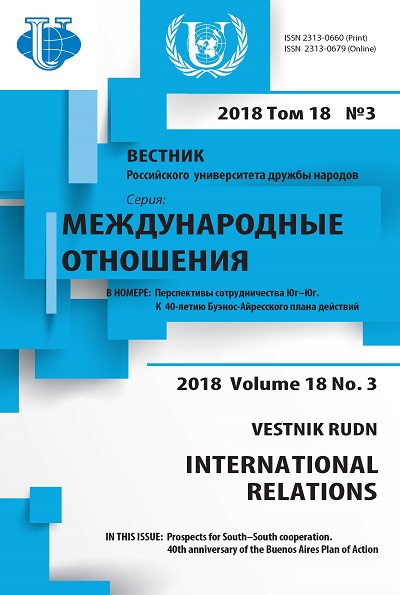TURKEY IN SOUTH-SOUTH COOPERATION: NEW FOREIGN POLICY APPROACH IN AFRICA
- Authors: Ozkan M.1
-
Affiliations:
- Turkish National Police Academy
- Issue: Vol 18, No 3 (2018): Prospects for South—South Cooperation. 40th Anniversary of the Buenos Aires Plan of Action
- Pages: 565-578
- Section: THEMATIC DOSSIER
- URL: https://journals.rudn.ru/international-relations/article/view/20104
- DOI: https://doi.org/10.22363/2313-0660-2018-18-3-565-578
- ID: 20104
Cite item
Full Text
Abstract
It is a fair treatment, without any exaggeration, to argue that the rise of Turkey in Africa in multiple areas as an actor is rather novel for foreign policy of Ankara. From development assistance to economy, politics to security, Turkey is now an influential player in African politics. Turkey’s Africa policy has more meaning than a normal foreign policy relation. It is also a mature deepening of South- South cooperation (SSC) in Turkish foreign policy. One of the most novel parts of Turkey’s foreign policy since 2002 is its endeavor to be part of the South-South cooperation and increase its visibilities in development aid projects. This involvement - both at state and NGO levels - is particularly palpable on the African continent. Rather than following the footsteps of other countries, such as traditional donors, Ankara has been trying to develop its own understanding and implementation - the Turkish way - based on experiences mostly gained from Balkans and Central Asian republics. These dimensions explain Turkey’s development policy at ideational, societal and institutional levels in Somalia and beyond in Africa. Religion along with trade is one of the key drivers of this policy at societal and state levels. At ideational front, there has been a new geographical imagination in Turkey that sees Africa from a totally different perspective comparing to a decade ago.
Keywords
About the authors
Mehmet Ozkan
Turkish National Police Academy
Author for correspondence.
Email: metkan82@hotmail.com
PhD, Associate Professor, Turkish National Police Academy, Ankara, Turkey
References
- Ali, A. (2011). Turkey’s Foray into Africa: A New Humanitarian Power? Insight Turkey, 13 (4), 65-73
- Anaz, N. (2014). The Geography of Reception: Why Do Egyptians Watch Turkish Soap Operas? The Arab World Geographer, 17 (3), 255-274
- Anaz, N. & Ozcan, C.C. (2016). Geography of Turkish Soap Operas: Tourism, Soft Power, and Alternative Narratives. In: Alternative Tourism in Turkey. Ed. by I. Egresi. Springer International Publishing, Cham, p. 247-258. doi: 10.1007/978-3-319-47537-0
- Anaz, N. & Akman, E. (2017). Turkey's Soft Power Capacity: Geopolitics of Aviation and the Turkish Airlines. The Arab World Geographer, 20 (4), 303-316
- Davutoglu, A. (2008). Turkey’s New Foreign Policy Vision: An Assessment of 2007. Insight Turkey, 10 (1), 77-96
- Davutoglu, A. (2012). 2013 Yılına Girerken Dış Politikamız. Ankara: Dışişleri Bakanlığı. (in Turkish)
- Donelli, F. (2018). The Ankara consensus: the significance of Turkey's engagement in sub-Saharan Africa. Global Change, Peace & Security, 30 (1), 57-76. DOI: https://doi.org/10.1080/ 14781158.2018.1438384
- Donelli, F. & Levaggi, A. G. (2016). Becoming Global Actor: The Turkish Agenda for the Global South. Rising Powers Quarterly, 1 (2), 93-115
- Hasimi, C. (2014). Turkey’s Humanitarian Diplomacy and Development Cooperation. Insight Turkey, 16 (1), 127-145
- Kavas, A. (2006). Osmanli Afrika Iliskileri. Istanbul: Tasam
- Kornegay, F.A. & Landsberg, C. (2009). Engaging emerging powers: Africa’s search for a ‘common position’. Politikon, 36 (1), 171-191. DOI: https://doi.org/10.1080/02589340903174717
- Langan, M. (2017). Virtuous power Turkey in sub-Saharan Africa: the ‘Neo-Ottoman’ challenge to the European Union. Third World Quarterly, 38 (6), 1399-1414. DOI: https://doi.org/10.1080/ 01436597.2016.1229569
- Ozkan, M. (2010). What Drives Turkey’s involvement in Africa? Review of African Political Economy, 37 (126), 533-540. doi: 10.1080/03056244.2010.530952
- Ozkan, M. (2011). Turkey’s ‘New’ Engagements in Africa and Asia: Scope, Content and Implications. Perceptions: Journal of International Affairs, XVI (3), 115-137
- Ozkan, M. (2016). Turkey’s Political-Economic Engagement in Africa. In: Emerging Powers in Africa: A New Wave in the Relationship? Ed. by J. van der Merwe, I. Taylor and A. Arkhangelskaya. New York: Palgrave, p. 217-231
- Ozkan, M.A. (2017). Turkish way of Doing Development Aid? An Analysis from the Somali Laboratory. In: South-South Cooperation Beyond the Myths. Ed. by A.B. Tickner, I. Bergamaschi. New York: Palgrave, p. 59-78
- Ozkan, M. & Akgun, B. (2010). Turkey’s Opening to Africa. The Journal of Modern African Studies, 48 (4), 525-546. DOI: https://doi.org/10.1017/S0022278X10000595
- Ozkan, M. & Orakci, S. (2015). Turkey as a “political” actor in Africa - an assessment of Turkish involvement in Somalia. Journal of Eastern African Studies, 9 (2), 343-352. doi: 10.1080/17531055.2015.1042629
- Siradag, A. (2013). The Making of the New Turkish Foreign and Security Policy towards Africa: The Rationale, Roots and Dynamics. Africa Insight, 43 (1), 15-31
- Uchehara, E.K. (2008). Continuity and Change in Turkish Foreign Policy Toward Africa. Gazi Akademik Bakış, 2 (3), 43-64
- Wasuge, M. (2016). Turkey’s Assistance Model in Somalia: Achieving Much With Little. Mogadishu: The Heritage Institute for Policy Studies
Supplementary files










